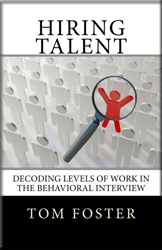“It’s really difficult to find good people out there, these days,” complained Byron. “Look at these resumes.”
He pushed the stack over to me. I glanced at the page on top and look what i found.
“I will take your word, that none of these resumes meets the standards you are thinking for the job. Tell me, how did these resumes make it to your desk?”
“Oh, we have a good process to weed out the bad ones,” Byron replied. “By the time they get to me, I should only see the top three or four candidates. But none of these people are qualified.”
“Do you think some overqualified people got cut from the resume pool?” I asked.
“Oh, sure, our people know what we are paying for the job and they can spot someone who is overqualified as easily as those who are under qualified.”
“And who is involved in this process?”
Byron’s head turned to the side and his eyes went up the far wall behind me. “Well, the hiring manager.”
“So, the hiring manager directly receives the emails from your job posting?”
“Well, no,” Byron backpedaled. “I don’t want to burden him with looking at all the resumes, so we have them sent to a generic email box. Irene is our receptionist, and she opens the emails and forwards the resumes she thinks are the best.”
“What do you mean, that she thinks are best?” I asked.
“Well, she deletes the ones from out-of-town and then marks the ones with two years experience. I don’t want the hiring manager wasting his time.”
“And then she delivers them to the hiring manager?” I tried to get the details of the sequence.
“Well, not exactly,” Byron continued. “Irene forwards them to one of the supervisors to cull over. I really don’t want the hiring manager wasting his time on unqualified resumes. He has enough other issues to deal with.”
“I see,” I nodded. “I think I am getting the picture.”
